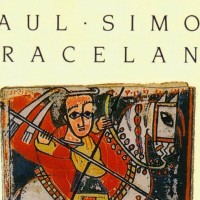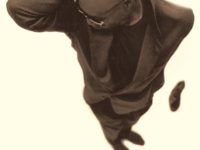In 1984, Paul Simon faced a creative crossroads. His last album, 1983’s Hearts and Bones, was a commercial disappointment, although it received some favorable reviews from publications like Rolling Stone.
In search of inspiration, Simon began listening to South African music, spurred on by a cassette called Gumboots: Accordion Jive Hits, Volume II. After immersing himself in more African music, he traveled to Johannesburg in early 1985 to simply jam with the groups he had heard: Tao Ea Matsekha, General M.D. Shrinda, and the Gaza Sisters. What happened in these sessions formed the basis of Graceland, the watershed 1986 work that not only revived Simon’s career, but exposed South African music to a worldwide audience. Twenty-five years later, Simon has released a deluxe edition of his masterpiece, offering listeners a new perspective on a still-relevant album.
The CD/DVD set includes the remastered original album, bonus tracks such as alternate takes and demos, and a DVD containing the original videos for “You Can Call Me Al,” “The Boy in the Bubble,” and “Diamonds on the Soles of Her Shoes”; an incredible Saturday Night Live performance of the latter track from 1986; and a new documentary, Under African Skies, that explores the making of Graceland. The box set features more outtakes, live performances, a lavish book, and a replica of Simon’s lyrics notepad. Both formats offer a unique opportunity to reassess just how important that one album was in the 80s, and how its impact continues today.
First, the remastered album further clarifies the intricate instrumentation of each track, and rightly spotlights a truly gifted artist: bassist Bahithi Kumalo. Just listen for his thrilling runs on “Diamonds” as well as “You Can Call Me Al” and the title track. His fingers fly across the frets at dizzying speeds, yet those notes function as the heartbeat of each song. The other stars, Ladysmith Black Mambazo, still stun with their beautifully blended vocals on “Homeless” and the beginning of “Diamonds.” The Gaza Sisters’ unusual style shines on “I Know What I Know,” their “woops” adding a sense of joy to the track. All of these sounds are grounded by Simon’s lyrics, which tell stories and sometimes inject humor into the proceedings. “She said there’s something about you that really reminds me of money,” Simon sings in a conversational tone. “She is the kind of a girl who could say things that weren’t that funny.” Describing someone using “money” and other superficial terms seems straight out of the 1980s.
“The Boy in the Bubble” contains some of Simon’s snarkier lines such as “The bomb in the baby carriage was wired to the radio” and “It’s a turn-around jump hot, it’s everybody jump start — it’s every generation throws a hero up the pop charts.” Only he could make disturbing images sound somewhat dry. But the title track represents some of Simon’s best work, as he improbably combines country, zydeco, and South African sounds into one wide-reaching tune. At first the lyrics seem out of place on this album, talking about the Mississippi Delta and strange stories of “a girl in New York City who calls herself the human trampoline.” Yet he convincingly makes the case that many music genres have their roots in African music; through his words and instrumentation, Simon leads the listener on a worldwide journey to show there are more commonalities than differences. After all, he sings, “I’ve reason to believe we will all be received in Graceland” — regardless of background.
Bonus tracks further examine Graceland’s formation, particularly an astounding demo of “Diamonds” featuring only Simon and Kumalo. The ebullient, stripped-down demo for “You Can Call Me Al” illustrates how Simon integrated African sounds into a more mainstream pop confection that loses none of its authentic roots. In a recent interview, Simon deconstructs the creation of “Graceland,” explaining how he composed the lyrics and requested that the Everly Brothers sing backup on the eclectic tune.
While the music videos charm, it’s the documentary and the Saturday Night Live clip that stand out on the DVD. When Simon was booked to play Saturday Night Live, the album had not been released yet. So he and Ladysmith Black Mambazo gave the audience a sneak preview of the album by performing “Diamonds.” In Under African Skies, Lorne Michaels admits that he was initially skeptical of this seemingly radical change in Simon’s sound. Would a song partially sung in a different language bearing an unusual tempo translate for a mainstream American audience? Judging by Simon’s broad grin and Ladysmith Black Mambazo’s enthusiastic kicks and dance moves, the group radiated confidence that earned them all an extended standing ovation.
Today Graceland is widely considered one of the best albums ever made, but upon its 1986 release it generated controversy. In the wake of Apartheid, the UN had instituted a cultural ban against South Africa to protest this barbaric regime. While the South African black musicians’ union voted to allow Simon to record there, Simon chose not to acquire permission from the African National Congress to violate the cultural embargo. In Under African Skies, director Joe Berlinger tackles this issue head-on by filming a conversation between Simon and South African politician (and Graceland critic) Dali Tambo; while the two agree to disagree, they end up embracing. A touching reunion between Simon and many of the original musicians — all parties still seem quite fond of each other– results in them performing the album tracks together for the first time in many years. Simon particularly hails Hugh Masekela and the late Miriam Makeba for championing the Graceland project; Makeba never performed on the album, but did appear on stops on the Graceland Tour to croon “Under African Skies” with Simon.
While the film recounts the making of Graceland and analyzes the accompanying controversy in a fascinating manner, Berlinger omits some interesting material. Why not interview the American musicians that also appeared on the album — Linda Ronstadt, Los Lobos, and top session guitarist Adrian Belew — and air their views of how playing African music differed in tempo and melody? That would have proven much more fascinating than hearing what Whoopi Goldberg and Oprah Winfrey thought of the album. Exploring how the album influenced generations of artists would also establish its legacy; only Vampire Weekend is briefly interviewed as to this topic. Finally, Graceland opened the door for a number of world artists like Youssou D’Dour (who appears on Graceland), Johnny Clegg and Savuka, and, of course, Ladysmith Black Mambazo. Yet this fact barely rates a mention.
Overall, the 25th anniversary edition of Graceland successfully argues why it remains a landmark in modern music history as well as one of the best albums of Simon’s career. With the possible exception of “All Around the World or the Myth of Fingerprints,” Graceland lacks any overtly ’80s production, giving it a timeless feel. Apartheid no longer exists, and Simon’s ambitious project may have served as an important force in that movement. Seeing the musicians and hearing their voices put a human face on the atrocities, hence promoting the anti-Apartheid cause throughout the world.
On a more basic level, Graceland exposed a mass audience to a kind of music rarely (if ever) heard, and showed how music can function as a culturally and politically uniting tool.
- The Rescued Early Paul McCartney Song That Completed ‘Beatles For Sale’ - December 4, 2024
- A Rare Beatles Cover Proves John Lennon Was Wrong About His Voice - November 26, 2024
- How John Lennon Came Roaring Back on the Beatles’ White Album - November 22, 2023



